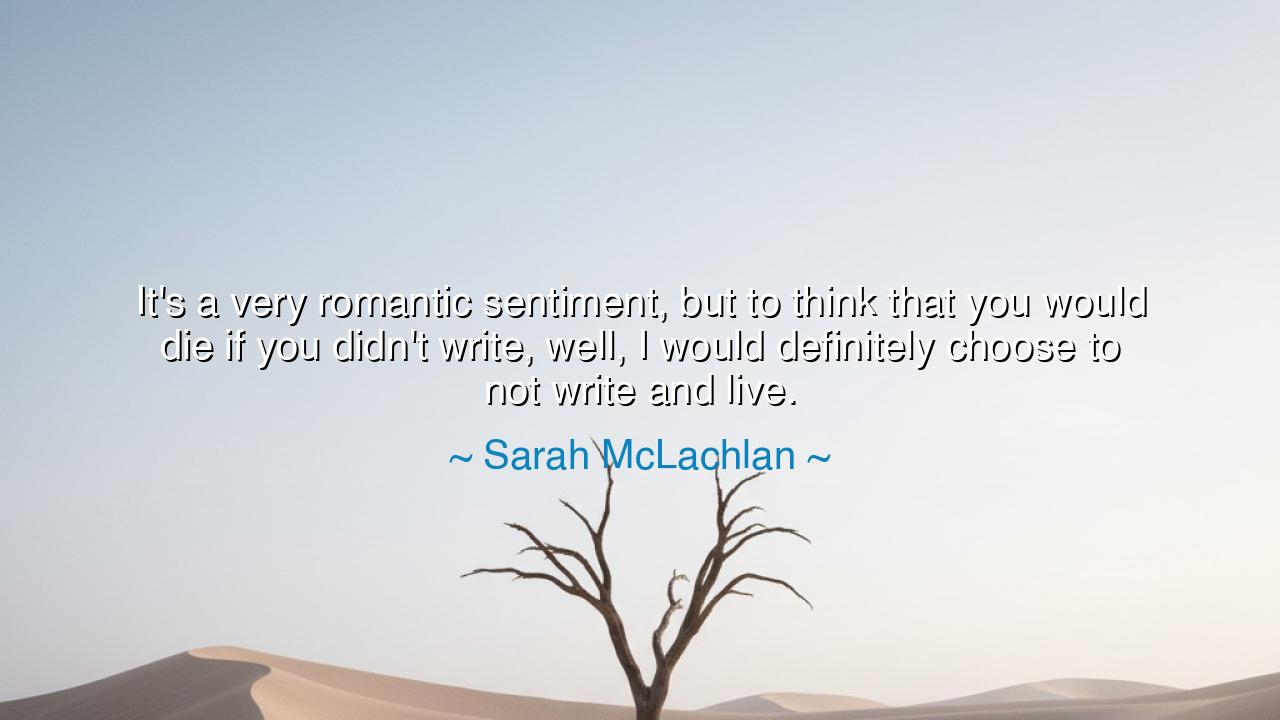
It's a very romantic sentiment, but to think that you would die
It's a very romantic sentiment, but to think that you would die if you didn't write, well, I would definitely choose to not write and live.






"It's a very romantic sentiment, but to think that you would die if you didn't write, well, I would definitely choose to not write and live." – Sarah McLachlan. These words from McLachlan strike a deep chord within the heart of anyone who has ever felt the pull of creativity and the compulsion to create. She acknowledges a romantic ideal, one that many artists and poets throughout history have entertained—the belief that to not create is to wither and die. But McLachlan, with a wisdom born from experience, challenges this notion, reminding us that life itself is the ultimate treasure, and that creation must not come at the cost of living fully in the world.
In the ancient world, many great thinkers believed that the act of creation was essential to the soul's fulfillment. Plato spoke of the divine inspiration that guided the artist, the poet, and the philosopher, believing that creativity connected humanity to a higher realm of understanding. For Aristotle, the pursuit of excellence in any field was a natural part of the human experience—whether through the art of writing, the beauty of sculpture, or the exploration of the natural world. In these ancient traditions, creation was seen as an act of life, not a death sentence. And yet, as McLachlan points out, it is the living—the experience of being fully present in the world—that is the true source of nourishment for the soul.
What McLachlan reflects on is a paradox that all creators face: the tension between the need to create and the desire to live. For many, the compulsion to write, paint, or compose can feel as though it is a matter of life and death, a passion that burns so intensely it threatens to consume everything else. But the wisdom of McLachlan’s words lies in the understanding that creativity should not overshadow the need for connection, for growth, and for life itself. If the act of creation becomes a burden, something that eclipses all else, then we risk losing sight of the very thing that inspires us to create in the first place: life.
There is a famous example of this tension in the life of the great composer Ludwig van Beethoven. Known for his insatiable drive to compose, even as his hearing began to fail, Beethoven often felt that his creative output was the very essence of his existence. Yet, as he neared the end of his life, even as his music reached monumental heights, he expressed deep feelings of isolation and despair, longing for the connection to others that had been denied to him in his obsessive pursuit of art. Beethoven's story is one of triumph and tragedy—he created some of the world’s greatest music, but it came at the cost of his peace of mind and his ability to connect with the world around him. It is a cautionary tale that reflects McLachlan’s belief: one must not choose creation over life itself.
To live, McLachlan teaches us, is not simply to exist, but to embrace all that life has to offer: the joys, the sorrows, the relationships, the moments of stillness, and the moments of profound connection. The act of writing, or any form of creative expression, can be a reflection of life, but it should never become so all-consuming that it replaces the very essence of what it means to live. Creation can be a bridge to understanding, but it is the act of living, of truly experiencing the world in all its complexity, that fuels the artist’s soul.
The lesson here is clear: balance is the key to living a full life as a creator. Just as McLachlan chooses life over the suffocating belief that one must write to survive, so too must we recognize that creation should enhance our experience of life, not diminish it. A creator who fails to live fully may find themselves creating only from the remnants of their soul, rather than from the vibrancy of the world around them. It is in the moments spent living—in the connections we make, the experiences we gather, and the peace we cultivate—that we find the true inspiration to create.
Thus, let us heed the wisdom of McLachlan and seek a life that is full and vibrant, a life that does not require the sacrifice of self for the sake of art. Let us create, yes, but let us also live—with all the joy, the pain, and the wonder that life offers. In this balance, we will find not only the fuel for our creations but the richness of our own existence, a richness that can only come from fully embracing the world around us. In the end, it is life, not art alone, that sustains us. Live fully—create with passion, but never at the cost of your own soul’s experience.






AAdministratorAdministrator
Welcome, honored guests. Please leave a comment, we will respond soon